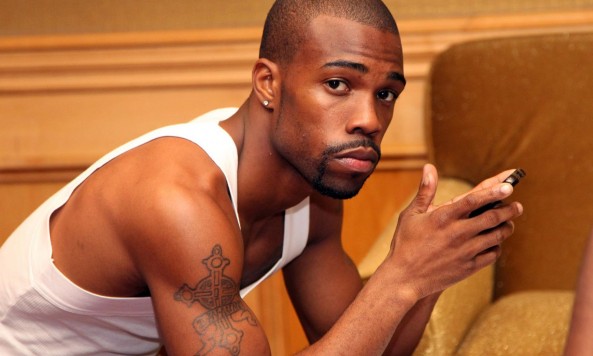"Russell unfazed by criticism," reads the recent RingTV headline about featherweight talent Gary Russell, Jr., and I believe he is. It would be impossible to go about his career the way he has if he cared what anyone thought, because the former Olympian and consensus 2011 Prospect of the Year has comported himself shamelessly since winning that status in a wildly successful — if deeply casual — campaign to turn boxing fans against him.
Russell is fighting Juan Ruiz this weekend. Ruiz has lost nine of his last 10 bouts. Less than three months ago, Russell bragged that he would easily defeat Abner Mares, the #3 man in the division; it's audacious to talk about how simple it would be to take out one of the best of the weight class, and the whole sport, then sign to face someone who has only won once since 2007. It's a little like boasting to a large audience that you can bench press 500 pounds, then expect a paying crowd to be impressed when you dead lift some "Happy Birthday!" balloons.
Mares was, for his part, generous in response, even if he meant his remark about Russell not facing "any A-level fighters" to be a dismissal. Russell's best opposition is probably D-level, C at best. He's 22 fights in, and he's never faced a former contender, or even someone who could be considered a gatekeeper or journeyman.
He and his team have explained this all away in a number of fashions. One is that he'll be ready soon, soon. The talk had been of him stepping up to fight for a world title in late 2012. Obviously that didn't happen. He didn't even come close. Now the talk is that he'll be ready for a title shot this year, too. If the other pump-fakes weren't enough to make you doubt it, then the whole part of his career (aka the last two years) where he has not shown the kind of forward motion you'd expect from someone preparing for a title run — stepping up competition, facing a ranked contender, etc. — ought to do the trick. Another excuse is that he's had some injuries, which is true, but why take each injury as an excuse to jump back two steps in the level of competition? The last excuse is the funniest: You see, nobody really wants to fight him. Except we live in a world where people fight far scarier creatures, like Gennady Golovkin and Lucas Matthysse, on purpose. Maybe some people have turned Russell down, but Russell equals Showtime exposure and money, and before that meant HBO exposure and money. You think somebody like Cristobal Cruz — who even now, despite a shaky record of late, would be the best opponent of Russell's career by a wide margin — wouldn't take a Russell fight, or someone like this?
The real explanation is somewhere else. A fair number of these mismatches have happened on HBO or Showtime, which partially is to blame for why it keeps happening: As long as HBO and Showtime are buying Russell's shitty opposition, why would Russell try any harder than he has to? (Answer: professional pride, but that's rarer in boxing than we'd like). It's easy to attribute THAT phenomenon to the influence of powerful adviser Al Haymon, and I recently did, but I've reconsidered… Right now, Haymon's fighters are by and large taking on stiff opposition: Matthysse-Danny Garcia (both with Haymon), Floyd Mayweather (Haymon) vs. Canelo Alvarez, the entire Knockout Kings II card a couple weeks back (the three "A-sides" all with Haymon), the upcoming Seth Mitchell-Chris Arreola bout (both are with Haymon) and more. Perhaps, instead, both networks fell in love with Russell, the Olympian, the fighter who can reach the African-American market, one of the most gifted young fighters in the world. It's happened before.
Whatever the case, Showtime isn't buying the latest Russell fight. Good for them. Friday's ShoBox tripleheader will not include Russell. The headliner is heavyweight Deontay Wilder, who fought in the same Olympics Russell did and has been criticized in some quarters for stepping up the competition exceptionally slowly. Yet Wilder is facing Siarhei Liakhovich, loser of four of his last six, but four losses vastly superior to the majority of the losses by Russell's opponent, with Liakhovich's defeats coming against three top 10 contenders and one top prospect. And at least Liakhovich has a win on his record since 2008, unlike Ruiz. Wilder, by the way, is infinitely less polished than Russell and doesn't have a fraction of Wilder's amateur experience.
It's true what Russell says: The people criticizing his level of opposition couldn't beat those same people. I sure couldn't. But I'm not a professional fighter, claiming he could beat Abner Mares then fighting Juan Ruiz. And maybe my criticism is stauncher because I want so badly to be a fan of Russell — he fights out of my region of the country, and his speed is intoxicating to a fan of my tastes. And if he eventually does take on stiff opposition and thrives, much of this will be swiftly forgotten.
It's clear, though, that it won't happen until somebody forces Russell to do it. "We're managing my career the way that we want our career to go," he said. "We've only got one shot at it. We're going to cross our 'T's' and dot our 'I's.'" It's well beyond that. At this point, he's drawing funny faces for the dots over the i's and doodling all over the page along the way to crossing the t's, mixing in a few sketches of middle fingers to anyone who might be looking over his shoulder.

